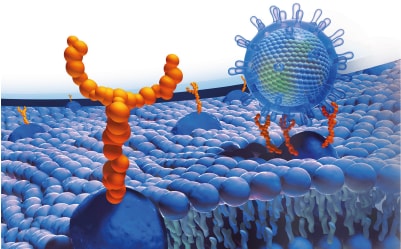Glycobiology

Glycobiology is the study of the biosynthesis, structure, function, and evolution of glycans and glycoconjugates. Studying the dynamic changes in glycan and glycoconjugate profiles is essential to understand key biological processes in organisms. The human immune system largely functions via glycan-protein interactions. The physiology and pathogen recognition of glycoproteins, glycolipids and carbohydrates are being studied for next-generation therapeutics, vaccines, and diagnostics for cancer and autoimmune diseases.
The carbohydrate moieties of cell surface glycoproteins and glycolipids function in cellular communication processes and physiological responses. Cell-surface glycoproteins and glycolipids provide anchors for intercellular adhesion and points of attachment for antibodies and other proteins, and function as receptor sites for bacteria and viruses. Altered cell surface glycosylation patterns are associated with cellular differentiation, development, viral infection, and are diagnostic in certain cancers, seven of them correlating to changes in the expression or localization of relevant glycosyltransferases.
Glycobiology Research Applications: Glycomics & Glycoproteomics
Common applications are glycomics and glycoproteomics research fields. They include areas such as glycan synthesis, glycosylation and deglycosylation, and glycan analysis. Glycomics is a subset field of glycobiology that aims to identify the structure and function of glycans or the glycome in a cell or organism. Glycoproteomics is focused on determining the positions and identities of glycans in glycoproteins in cells or tissues. Mass spectroscopy is widely used in both glycomics and glycoproteomics fields of study, but analysis is still very challenging due to the diversity of glycans and the variations of glycosylation sites.
Related Articles
- Explore the role of hyaluronan, hyaluronic acid structure, hyaluronan synthesis & degradation, and more. Find GAGs, hydrogels, and scaffold kits.
- The biosimilar market is expected to grow rapidly in the coming years, as many blockbuster monoclonal antibodies lose patent protection by 2020.
- Explore our complex carbohydrate proteins, enzyme products and kits for investigating oligosaccharides, polysaccharides, and numerous additional aspects of your carbohydrate workflow.
- Glycosaminoglycans are large linear polysaccharides constructed of repeating disaccharide units.
- Glycans play a key role in protein structure and disease; representation on cell surfaces is the glycome.
- See All (26)
Related Protocols
- Fast, high-resolution separations of procainamide labeled glycans - dextran ladder, human IgG and cetuximab
- Uncover how HPLC analysis of glycans helps researchers analyze glycan structures and glycoforms & find products to assist in your glycan analysis methods.
- Enzymatic Deglycosylation Strategies: Sequential hydrolysis of individual monosaccharides from glycans can be useful for the elucidation of the structure and function of the glycan component.
- N-Glycosidase F Protocol & Troubleshooting
- Explore mass spectrometry analysis of glycans for glycomic & glycoproteomic neutral & acidic glycan analysis. See a general mass spec glycan analysis procedure.
- See All (6)
Find More Articles and Protocols
To continue reading please sign in or create an account.
Don't Have An Account?